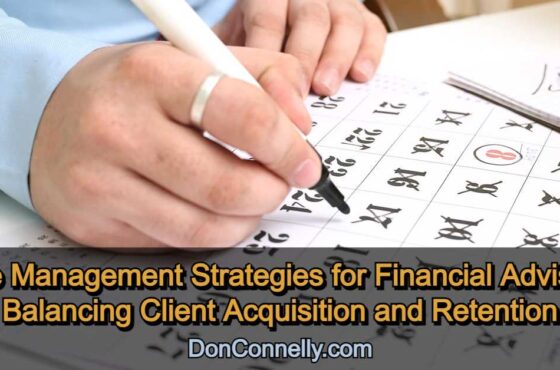Want Your Clients to Take Their Financial Plan Seriously? Keep It Front and Center in Your Relationship
 It wasn’t so long ago that clients perceived financial plans as an extension of the prospecting process to entice them to open an account and hand over their money. Many financial advisors feigned the role as a financial planner to create the perception of objectivity with the recommendations they would make. Clients received a faux leather-bound financial plan that just took up shelf space, never to be revisited by them or their advisor.
It wasn’t so long ago that clients perceived financial plans as an extension of the prospecting process to entice them to open an account and hand over their money. Many financial advisors feigned the role as a financial planner to create the perception of objectivity with the recommendations they would make. Clients received a faux leather-bound financial plan that just took up shelf space, never to be revisited by them or their advisor.
Fast forward to today, and we see an increasing number of financial advisors who are committed to a more holistic approach to working with clients, making the financial plan a critical cornerstone of their relationships. That, of course, is in response to what more and more clients are looking for in their advisor relationships—a plan that addresses the entirety of their financial life to guide them in life-critical decisions.
Why is it then that the value of a well-conceived financial plan seems to wane among clients who, further into the advisory relationship, begin to question their advisor’s advice or express disenchantment because their investments are underperforming their neighbor’s or colleagues’ portfolio? What do advisors need to do to get their clients to refocus on what’s really important?
Financial planning is a process, not a product
The first thing that your clients need to understand from the beginning is that the financial planning process is ongoing and that the financial plan they receive is a snapshot of a moment along a long timeline. The process you use to develop that initial plan must repeat itself year after year—reexamining, confirming, and prioritizing goals, showing them where they stand in relation to their goals, playing out risk trade-offs with solutions, and aligning their expectations with what the plan is expected to achieve. This requires meeting with your clients at least once a year for a formal plan review and update.
Keep your clients focused on the long game
Your clients are going to experience all sorts of emotions along the way, including fears over short-term market volatility and concerns over economic conditions. Emotions have a way of making people question everything and often lead to regrettable decisions. It’s important to remind them that the only thing that matters is achieving their long-term goals and that short-term events have always been temporary. Sometimes adjustments have to be made or even a slight course correction, but they need to be made in accordance with the plan. To do otherwise means they’re flying blind.
Demonstrate their financial plan in action
You can demonstrate the importance of their financial plan throughout the course of a year. It’s important to remind your clients that any advice you give or decision you recommend is based on their financial plan. When you rebalance their portfolio, it’s based on their target asset allocation established in the plan. If a proposed tax change comes along, you can let them know how it impacts their plan. If they are ahead of schedule in accumulating for retirement, you can discuss possible changes in their timeline or adjustments to their risk-return profile. Whatever discussion comes up between you and your client, always keep their plan at the center of it.
Revisit the “Why”
There’s a reason why your clients came to you to develop a financial plan. In your discovery, you got your client to connect with their core values and reveal their life ambitions. They were honest and sincere in expressing their concerns and willingness to commit to a plan because they wanted to be guided by principles. That conversation needs to be revisited often, especially when something comes up with the potential to knock them off that foundation.
You are an extension of the financial plan
Your clients didn’t come to you because they wanted a financial plan. They could have gotten that from anywhere. They came to you because they wanted sound, objective, and personalized advice. Your greatest value to your client is your willingness to have frank conversations about their finances and to hold them accountable for their decisions. The only way you can do that in a way your clients will appreciate it is to base it on the financial planning process you started with them at the beginning.
Watch this 3-minute video to learn how our training program ‘Become Brilliant at the Basics’ can help you grow your business in a predictable and steady manner by focusing on developing the right skills.
See program details and enroll today!
Available in a self-paced format (always open) and as a 12-week coaching program (open a couple of times a year), this training will change the way you view your practice and give you an enormous advantage over your competition. Select your format and enroll now.



